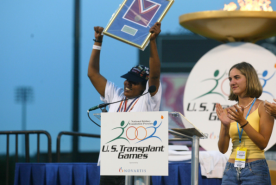September 22, 2022
You may have heard the term "self-care,” but what does it mean and how do you practice it? Self-care is simply taking time to focus on your mental and physical health. Some may prefer going to the spa or on vacation, while others may want to talk to loved ones or go to therapy. Whatever self-care looks like to you, here are eight ideas to get you started.
1. Make sure you're sleeping well
Many people with kidney disease experience some sort of sleep disorder. Whether due to stress or side effects, lack of sleep can present a big problem in your daily life.
Here are five ways to make your sleep routine better:
- Turn off electronics and dim the lights an hour before bed to signal your brain that it's time to rest.
- Do something that relaxes you, like taking a walk or a bath.
- Set up your sleep environment by ensuring it is cool, dark, and quiet.
- Avoid large meals, caffeine, and alcohol before bedtime.
- If sleepless nights become persistent, speak with your healthcare provider. They're best suited to help create a sleeping routine that will work for you.
2. Do something fun
Life can get predictable quickly, but having fun and trying new things are the best ways to combat boredom. For Lavonne and her son, Kory, whose kidneys failed when he was 19, fun meant playing online video games together.
"We were trying to distract each other from what the dialysis can bring, monotony. I would play with him remotely. In the lobby of the game, sometimes we would be alone and we were able to talk about anything. I was there with him, playing games," Lavonne said. "[It was] his outlet, his joy in those hours. He used to say, 'Mom, it went really quick today because we are playing games.'"
If playing video games isn't your thing, that's okay! Think about what you consider fun, new things you'd like to try, and start crossing items off your list.
Join the NKF Blog Newsletter
Get inspirational stories and kidney disease resources delivered to your inbox every month. You'll gain practical insights and expert advice to help you better understand and manage your kidney health no matter where you are on your kidney journey. Subscribe today.
3. Get moving
Creating an exercise plan is easy, but sticking with it isn't always as simple. Start small by picking one activity you enjoy and do it for a few minutes every day. You can also break a thirty-minute workout into 3, 10-minute sessions throughout the day.
Exercise is not one-size-fits-all, so get creative and try out different activities like:
- A free online yoga video.
- A group exercise class.
- Walking around the block.
- Dancing it out in your living room.
- Hiking, swimming, or going on other outdoor adventures.
4. Join a community
Whether you have a great support system or not, finding a community of people who understand what you're going through can help you feel less alone.
Join an NKF Kidney Community and follow National Kidney Foundation on Facebook: Our online communities offer a safe, anonymous space for people with kidney disease, those on dialysis, transplant recipients, and people considering donating a kidney to talk, ask questions, and find answers.
Become a Voices for Kidney Health Advocate: Share your story online or in person to change public policy and meet our amazing advocates, like Armand, who are doing the same.
"New advocates find a supportive network of people going through all kinds of different types of kidney disease, genetic kidney disease, acute kidney injury, end-stage transplant, and all the different stages," said Armand. "They're able to come out of their shell and feel less alone. They find a community where they belong, and seeing them is great."
Participate at a local NKF Walk or volunteer: Meet people in your area who have kidney disease, care for someone with kidney disease, or are interested in raising kidney disease awareness. Events range from golf tournaments to culinary events, galas, and honors ceremonies.
5. Try meal prepping
Give future you a break by preparing your meals ahead of time. Not only will it save you time and energy, but it may also help reduce impulse eating, provide built-in portion control, and reduce food waste!
How to get started with meal prepping:
- Double or triple the next meal you make and freeze the leftovers.
- Prep your vegetables by washing and cutting them.
- Pick one day and cook away until you have enough food to freeze for the next month.
6. Spend time with your partner, friends, and family
Spending time with loved ones is a great way to feel connected and enjoy yourself. So, schedule some quality time and have fun!
Here are kidney-disease-friendly activities to try:
- Plan a BBQ, picnic, or dinner party.
- Play a round of mini golf or go bowling.
- See a movie, a play, or your favorite sports team.
- Host a game night.
- Go to a museum or art gallery.
Hanging out in the backyard, sitting on the couch, and relaxing at home are also perfectly great activities. As Jason, a kidney transplant recipient, might say– all that matters is that you're together.
"Prior to my kidney failure, I was a workaholic. I wanted to work all the time," Jason said. "Now, I want to make sure that I'm spending time being in the moment with my family and not taking things for granted. These are things that I would have never done prior but now it's like those moments are what make me happy."
7. Remember your medications
Taking your medications as directed is crucial for maintaining your health but can be easily forgotten.
Here are a few ways to help you stay on track:
- Use a pillbox, app, mobile phone, or watch with an alarm.
- Place medications where they are visible but out of reach of children or pets.
- Schedule your medications at the same time as regular daily routines.
- Keep a small medicine supply in your bag, at your desk at work, or in other helpful places.
- Use this free prescription discount card to make medicines more affordable.
Speak to your healthcare practitioner if you have difficulty sticking to your medication schedule. They’ll be able to help you create a routine that works for you.
8. Talk with someone who’s been in your shoes
Kidney disease is overwhelming. You may feel upset or unsure where to go next, but there is someone who can be by your side throughout your kidney health journey. Our Peer mentors are living with kidney disease and are trained to give you the support you need.
For Heather, NKF Peers allowed her to open up and discuss her condition with someone who went through kidney disease themselves.
"During this kind of year-long period where I was getting worked up for the transplant, I had a lot of trouble wrapping my mind around the transplant. I had anxiety, worries, and fears about this process," Heather said. "I didn't like to talk about my kidney disease until I met my mentor via phone. I found it very easy to connect with her and instantly was relieved that I had someone who I could be my "true self" with about this kidney process."









